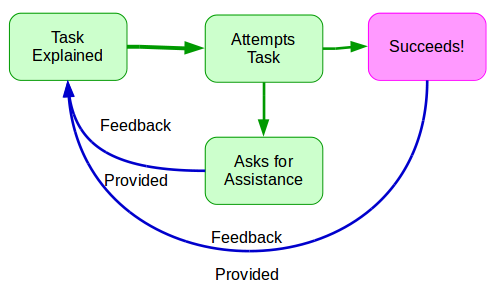Summary: Before your new analyst arrives, make sure they have access to the data, hardware, and software they’ll need. Set and discuss expectations on what the analyst should know and learn. Get others involved in the development with mentors and formalized “get to know” meetings.
Before They Get There
- You have clear expectations.
- They have a computer / they have all the software they need.
- They have appropriate read/write permission.
Your Expectations
Do not assume your analyst and you are on the same page. If you’re hiring someone, you should have a goal in mind for what they should be able to accomplish. That goal should have been discussed in the interview and right when they start.
You’ll need to develop both short-term (30/60/90 days) and long-term (year 1, year 2, year 5?) goals in order to gauge how well they’re doing. Any analyst starting out will need time to understand the data and the business. But maybe 60 days out they should be contributing more – depending on their past experiences. In order to get started, ask yourself these questions about your new analyst.
- Do I expect to walk through their queries / programs?
- When should they be self-sufficient?
- What sort of projects will they be working on?
- How long should it take for them to learn 80% of the data we use?
Answering these sorts of questions help you as the manager set the right expectations. You should absolutely share your expectations with your new hire and anyone involved with your team so that everyone is on the same page.
Hardware / Software / Permissions
If your team are the only ones doing advanced analyses, it’s important to get the hardware and software right. It depends on needs:
- Hardware: Did you tell IT that you need a new computer?
- Hardware: Do you need more RAM for in-memory analytics?
- Hardware-ish: Do you need access to any cloud services like AWS or Azure?
- Software: Will the analyst have local admin rights to add any other software?
- Software: Which version of any approved language do you need (Py2.7 or 3.x+)?
- Software: Any proprietary software that requires another license?
On the local admin rights: Are you concerned about security? Are you really hiring someone you think will do something malicious?
- Permissions: Any SQL permission groups they need to be a part of?
- Permissions: Are there specific tables they will need acces to?
- Permissions: Will they need CREATE / ALTER / DROP permissions in any database?
It all goes back to knowing what your expectations are. Map tasks to data and then send those tables right over to your IT / DBA group to create a smooth first day for your new analyst.
Educating The Analyst
- Teaching the Data
- Meeting Key People
- Assign business and data mentors
Teaching the Data
One of the biggest obstacle for a new analyst is not knowing where data exists and the relationships in the data. That includes the big picture ideas such as why is this data important. As a result, the biggest thing you can do is provide your new analysts with a cheat sheet of important numbers, a swipe file of important reports, and access to an accurate data dictionary.
With all of these tools an analyst needs time and encouragement to make use of them. Even then you should expect them to struggle with your data and you should be patient!
The process of teaching someone to be analytical is outside the scope of this post but will be covered in a later post.
Key People to Know
Even if you do know everything, you should not want to be the only resource for your employees. A good analyst is one that knows where to get data and who knows more about the data. As a manager, you need to start building their network. Try answering these questions to help point your analyst in the right direction.
- What departments do you work with often?
- Which groups do you rely on for data?
- Which groups rely on you for for analyses?
- Who in IT helps answer questions?
You will have to encourage using the network the analyst builds! It’s easy to fall back on asking a manager for info. Maintaining that network is a big step toward making your employees more successful.
Mentors

I am a proponent of formal mentors in training new employees. I would suggest assigning two mentors to any new analyst: a data mentor and a culture mentor.
The Data Mentor is someone that the analyst can go to with any data question and get the answer or at least get pointed in the right direction. This could be you, the manager, or it could be the lead analyst in your group. In either case make sure the new analyst and the data mentor have clear expectations for how they can use that resource.
- An initial training class?
- Weekly training?
- Office hours for the mentor?
- Query reviews or just explaining tables?
- Areas of expertise (transaction data vs marketing campaign data)?
- Just data or tools or report writing?
The Culture Mentor is meant to be a reference for the softer things: Dress code, how to approach people, writing style, and maybe just someone to eat lunch with.
The manager can be the culture mentor but there are some things new employees don’t want to discuss with their manager. It’s not a bad thing, it’s just that a new employee wants to build a good impression with their boss. Having another person to ask “dumb” questions to makes a new employee feel less “dumb” in front of their boss.
A few notes on using mentors:
- Mentors need to know your expectations and be in-sync with your desires.
- Tools the analyst should use, data sources, big picture ideas.
- Mentors should be formally recognized for their extra efforts.
- An analysts success should be attributed partly to the mentors’ efforts.
Guiding the Analyst

- Providing feedback (code and cultural)
- Receiving feedback
Providing Feedback
For an analyst to improve, they will need to get feedback on their queries and on how they’re fitting in with the group. A big part is figuring out how you will provide that feedback.
- On a project basis?
- Weekly reviews?
- Formal analysis review?
- Look at the queries or just the reports?
There are a lot of things to critique and improve on first time analyses. It’s guaranteed that even an analyst with years of experience doesn’t write in the style you think works best. But the way you deliver the message and how often is up to you.
Receiving Feedback
As a manager, you dole out advice and tasks, expect accurate and timely results, and develop your team. With all that on your plate, you would be remiss to ignore accepting feedback from your team. Listening to your team and taking action on their concerns is the mark of a great manager.
This is another area that requires your judgement. Especially in the first few months, you should encourage your new team member to give you feedback on how they’re feeling, where they’re struggling, and what’s working for them. Your best laid plans for making an effective workplace might fall flat. But you’re nothing but adaptable, right?
